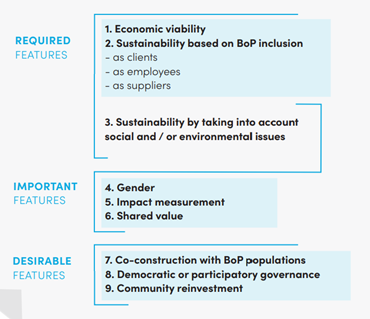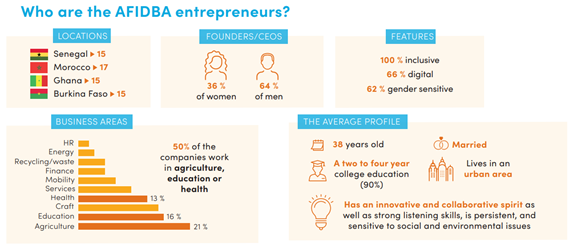How to support Inclusive Business in Africa?
This year, CARE France published a white paper on inclusive business. The booklet resulted from the AFIDBA project coordinated by our partner Bond'innov, which accompanied more than 60 inclusive businesses in four African countries over the course of three years. Based on this experience, we have written the booklet to support entrepreneurs in their inclusive approach but also to inform funders and multi-national enterprises of the various opportunities that this new type of business brings.
Initiated in 2019 and financed with two million euros by the French Development Agency (AFD), the AFD for Inclusive & Digital Business in Africa (AFIDBA) program has identified, accompanied, and financed the acceleration of 61 inclusive businesses. This support took the form of three main activities: capacity building for incubators and entrepreneurs, acceleration of entrepreneurial initiatives, and awareness raising on contemporary issues. Each start-up also received financial support from private and public actors ranging from 5,000 to 15,000 euros.
Building on this program and collaborating with entrepreneurs, incubators, scientists, and experts, we were able to write a white paper on inclusive business to disseminate our advice, best practices, and recommendations to all actors intrigued by inclusive business.
Tools for inclusive business
We wrote the white paper on Inclusive Business to provide entrepreneurs with tools and best practices to make their company more inclusive.
This translates, for example, into a shortlist of six methodologies and tools to measure the social impact of one’s business. As the saying goes, “What gets measured gets done” – “… in an inclusive manner”, we could add. One AFIDBA entrepreneurs explains: "We know that our business has an impact on the lives of the populations affected by our activity. But we need to be able to demonstrate this, and for that, we need support”. This support comes in the shape of qualitative and quantitative data: Measuring impact helps improve business resilience and inclusiveness. Additionally, it is also a soundboard for decision making and a tool for investors.
We also recommend the use of digital technologies, which can be an asset for entrepreneurs and vulnerable populations in Africa. Digital payments, for example, can support the financial inclusion of vulnerable communities, while e-education can empower youths.
For example, Aissatou Sall, an AFIDBA entrepreneur, developed the social and solidary communication agency VideoPositive. The company supports digital access to vital information. Based on the principle that knowledge increases everyone's ability to act, it distributes and creates educational video content accessible to vulnerable populations. One video, for example, explains the rights of pregnant women in the workplace. Today, the VideoPositive community has more than 6000 members, 15 client organizations, and 70 videos!
What’s more, digitalization can be an opportunity to facilitate resources management tasks. Built company (from the AFIDBA program), for example, offers an app to help businesses improve their record keeping and obtain credit.
The gender issue is also central, and we recommend integrating it into entrepreneurial business models in order not to exclude women. In this sense, we outline good practices tested by the entrepreneurs of the AFIDBA program. These include implementing a gender strategy within the company or raising awareness and engaging communities, more specifically men and boys, on gender issues.
25 recommendations for the inclusive entrepreneurship ecosystem
One of our main goals with this white paper was to come up with a common definition of inclusive business. We have translated it into a list of nine characteristics necessary to identify companies active in this field or to guide those who wish to move towards it (see picture 1).

We also identify main challenges and opportunities for each actor in the ecosystem (states, entrepreneurs, funders, and incubators) to propose 25 concrete, targeted recommendations to promote inclusive entrepreneurship. We consulted with Inclusive Business stakeholders to identify four key needs: how to incentivize, inform about, invest in, and implement inclusive businesses? That is what the white paper's recommendations addressed. Our core recommendation is to give more visibility to inclusive and social entrepreneurship by disseminating the topic, making it explicit and giving it a framework with, for example, the adaptation of financing tools for this form of business. In a nutshell, we need to create a global movement for inclusive business.
A participatory white paper tested by field experience
It was important for CARE to write the booklet in cooperation with the inclusive entrepreneurship community. It is based on 250 literature reviews and some 70 interviews with researchers, practitioners, and entrepreneurs. In addition, it draws on the findings of 9 panel discussions held during the project and qualitative and quantitative evaluations of the AFIDBA program.
In the field, AFIDBA accompanied 61 start-ups (see picture 2), selected from 944 applicants, for six months through acceleration and incubation programs. The white paper builds on experiences, tools, and good practices drawn from the program.

We believe this white paper can support the emergence – in Africa and the rest of the world – of a viable, dynamic, and sustainable inclusive entrepreneurship ecosystem. As Fatou Mourate Sar, founder of social enterprise Murafa, said, “Inclusive business is described as a new market, but in fact, it is a continuum. Inclusive business is not an alternate model, it is rather the future of business.”
